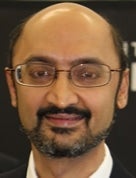Date: Thursday, October 17, 2013 at 3:30 pm
Location: DC 1302

Srinivasan
Keshav
University
of
Waterloo
Cheriton
School
of
Computer
Science
Lecture
title:
"Information
Systems
and
Science
for
Energy"
Lecture
abstract:
The
generation,
distribution,
and
consumption
of
energy
lie
at
the
foundations
of
modern
civilization.
Traditional
energy
systems
are
centralized
and
carbon-intensive,
with
minimal
energy
storage,
infrequent
monitoring,
and
inefficient
models
of
consumption.
In
contrast,
future
energy
systems
will
incorporate
tens
of
millions
of
stochastic
renewable-energy
sources
and
vastly
more
storage.
Unlike
the
consumers
of
today
—
information
poor,
control
poor,
and
energy
rich
—
driven
by
the
availability
of
pervasive
communication,
control,
measurement,
and
computation,
future
consumers
will
be
information
rich,
control
rich,
and
energy
frugal.
Moreover,
future
energy
systems
are
likely
to
have
an
architecture
that
resembles
the
Internet,
i.e.,
large-scale,
loosely-coupled,
distributed,
and
heterogeneous.
My
research
hypothesis,
therefore,
is
that
technologies
and
concepts
originally
developed
for
the
Internet
will
play
a
key
role
in
future
energy
systems.
Given this overall motivation, the focus of my research group is on three disruptive technologies: electric vehicles, storage, and distributed renewable energy sources, especially solar energy. We have studied these elements in the context of smart homes and buildings, and in the distribution network. In this talk, I will touch on some examples of our work and discuss the potential for computer science researchers to tackle open problems in energy systems.